Source
Book One, Wanderlust
Scene 101—Meadows above Schabbach[1]
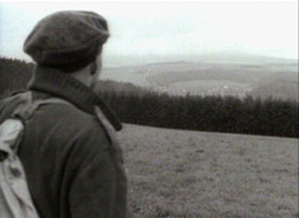
The meadows spread out calmly on a hill outside of Schabbach and breathe heavily as Paul returns from the war. Wearily, he strides across the green of his homeland towards his village, Schabbach. With the view of the village below, his limbs, exhausted from the long march, regain strength, and a look of happiness and redemption comes across his war-dazed face.
Scene 102—Village street in Schabbach
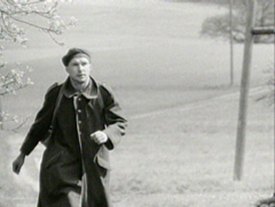
Paul arrives in Schabbach. He surveys the buildings of his village as if they were a mirage: the small homes, the farmyards, the village church. The church was the center of the community of two hundred souls. Arriving at the church square, Paul stops and gazes at the village. It seems as if this view could be a consolation for the past years of war. An older resident of the village is busy leading his small goat herd back home. Curious, one kid stops and sniffs at a pig rooting in the mud at the side of the road. This amuses Paul and a redeeming smile spreads across his face.
Scene 103—Mayor’s house in Schabbach (Maria’s parents’ home)
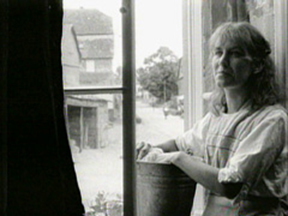
Maria leans out to wash an open window when she notices Paul’s reflection in the windowpane. She turns her gaze toward the street that Paul is walking down in the direction of his parents’ home. Maria’s mother, the mayor’s wife, evidently noticed Paul as well, and with curiosity she presses herself up to the window to risk a glance through the lace curtain. Maria enthusiastically turns to her mother.
MARIA: Isn’t that Paul Simon?
Scene 104—Village street in Schabbach
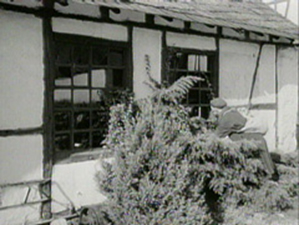
Paul starts walking faster. When he meets an elderly village resident who is pulling a hay cart behind her, Paul nods his head to her as he walks, silently but warmly. His desire to get home is too great for him to stop along the way to be asked how things went for him and where he was during the war. The old woman stops and gazes dumfounded at the returnee. As Paul continues, he sees a young woman standing on the other side of a grated window at the innkeeper’s, washing panes of glass. It is Apollonia, the maid. Paul has never seen her before. His gait slowing, he nods to her in greeting and then goes on his way. Apollonia sends him a shy glance in return. Outside, Glasisch is standing in front of the window and lustfully wiping the pane from the outside, playfully trying to get Apollonia’s attention.
APPOLONIA: Oh, go away!
Appolonia is disgusted by Glasisch and wrings her window rags out in a tin pail. She is transfixed as she looks into the dirty water and her black curls dance on her cheeks. It gives her a very sad, forlorn, and strange expression.
Scene 105—Entrance to the farm, blacksmith’s shop, Paul’s parents’ house
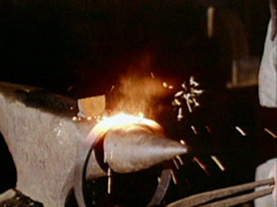
Paul’s steps become quicker as he hurries around the corner of the house. Loud hammering is coming from the blacksmith’s workshop; it is music to Paul’s ears. As he looks through the small panes into the workshop interior, dancing iron filings fly toward him. His father is absorbed in his work, forming a wheel shoe by striking his hammer onto the glowing red and yellow metal. Paul hurries to the workshop and grabs a sledgehammer to help his father, who steps outside. The father acknowledges the return of his son with a short glance but first wants to finish his work. Together they hammer the wheel, which they then mount onto the shaft as a team. Only then does Mathias speak to Paul.
MATHIAS: The cart belongs to Kath Legrand. Her son Helmut was killed at the bend in the Vistula River.
Mathias then goes back into the workshop while Paul finishes mounting the wheel. He takes off his backpack and follows Mathias into the workshop, where together they form another piece of iron with alternating hammer blows. Meanwhile, Katharina Simon, Paul’s mother, steps out of the house and recognizes her son, who had been presumed lost.
MATHIAS: Thank God!
Now Paul also notices his mother.
KATHARINA (to herself): Paul is back!
Paul hurries to Katharina, who awkwardly grabs him by the shoulders and at the same time tries to push him into the house, to the center of the family. But Paul twists out of her embracing arms and speaks lovingly to her.
PAUL: Mother, wait a minute!
Paul goes toward the manure heap, which is between the blacksmith’s workshop and the house, and as he walks he opens his fly to pee on the heap. Katharina comments on Paul’s ritual with a hearty, relieved laugh to her husband Mathias, who also observes the scene from the workshop. As Paul stands at the dunghill and empties his bladder, it is as if all the pressure, all the fear and desperation of the past years, flow out of him.
Notes
Source: Edgar Reitz, Script for Heimat, Book 1: Wanderlust. Munich, 1984, pp. 1-4. Republished with author permission.